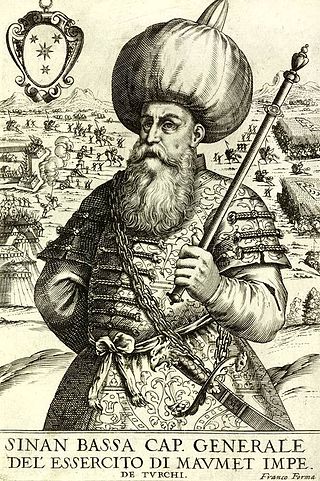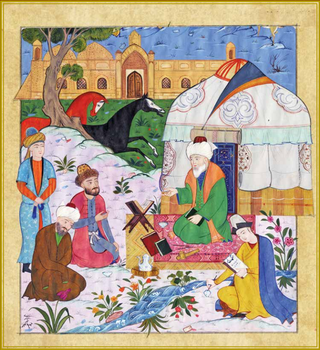Related Research Articles

Merzifonlu Kara Mustafa Pasha was an Ottoman nobleman, military figure and Grand Vizier of Turkish origin, who was a central character in the Ottoman Empire's last attempts at expansion into both Central and Eastern Europe.

Ottoman Turkish was the standardized register of the Turkish language used by the citizens of the Ottoman Empire. It borrowed extensively, in all aspects, from Arabic and Persian, and its speakers used the Ottoman Turkish alphabet for written communication. During the peak of Ottoman power, words of foreign origin in Turkish literature in the Ottoman Empire heavily outnumbered native Turkish words, with Arabic and Persian vocabulary accounting for up to 88% of the Ottoman vocabulary in some texts.

Äynu is a Turkic cryptolect spoken in Western China. Some linguists call it a mixed language, having a mostly Turkic grammar, essentially Uyghur, but a mainly Iranian vocabulary. Other linguists argue that it does not meet the technical requirements of a mixed language. It is spoken by the Äynu, a nomadic people, who use it to keep their communications secret from outsiders.
The Sun Language Theory was a Turkish pseudolinguistic, pseudoscientific hypothesis developed in Turkey in the 1930s that proposed that all human languages are descendants of one proto-Turkic primal language. The theory's counterfactual promotion of Turks as a progenitor race led to it finding favour among Turkish ultranationalists, who used it to justify their radical nationalist ideologies.

Koca Sinan Pasha was an Albanian-born Ottoman Grand Vizier, military figure, and statesman. From 1580 until his death he served five times as Grand Vizier.

Ármin Vámbéry, also known as Arminius Vámbéry, was a Hungarian Turkologist and traveller.

Ahmad Yasawi was a Turkic poet and Sufi, an early mystic who exerted a powerful influence on the development of Sufi orders throughout the Turkic-speaking world. Yasawi is the earliest known Turkic poet who composed poetry in Middle Turkic. He was a pioneer of popular mysticism, founded the first Turkic Sufi order, the Yasawiyya or Yeseviye, which very quickly spread over Turkic-speaking areas. He was a Hanafi scholar like his murshid, Yusuf Hamadani.
Ahmet Ağaoğlu, also known as Ahmet Bey Ağaoğlu, was a prominent Azerbaijani and naturalized Turkish politician, publicist and journalist. He was one of the founders of Pan-Turkism and liberal Kemalism.

Kâtip Çelebi, or Ḥājjī Khalīfa ; was a Turkish polymath and author of the 17th-century Ottoman Empire. He compiled a vast universal bibliographic encyclopaedia of books and sciences, the Kaşf az-Zunūn, and wrote many treatises and essays. “A deliberate and impartial historian… of extensive learning”, Franz Babinger hailed him "the greatest encyclopaedist among the Ottomans."
Ishbara Qaghan or Erfu Kehan ; personal name: Chinese: 阿史那攝圖/阿史那摄图, pinyin Āshǐnà Shètú/Niètú; Wade–Giles A-shih-na she-t'u/nie-t'u) was the first son of Issik Qaghan, grandson of Bumin Qaghan, and the sixth khagan of the Turkic Khaganate (581–587). His name is non-Turkic.

İlber Ortaylı is a Turkish historian and professor of history of Crimean Tatar origin at the MEF University, Galatasaray University in Istanbul and at Bilkent University in Ankara. In 2005, he was appointed as the director of the Topkapı Museum in Istanbul, until he retired in 2012.
Erich Feigl was an Austrian documentary film producer and author. He produced almost 60 documentaries, mostly for the Austrian ORF but some for BR (Bavarian), ZDF (German) and TRT in co-production. He authored books about the Habsburgs, whose restoration he supported, and the historical fact of the Armenian genocide, which he denied until his death.
Pasha was a higher rank in the Ottoman political and military system, typically granted to governors, generals, dignitaries, and others. Pasha was also one of the highest titles in the 20th-century Kingdom of Egypt and it was also used in Morocco in the 20th century, where it denoted a regional official or governor of a district.

Mustafa Pultar is a Turkish academic who is a scholar of building science. He did graduate studies at Princeton University, then taught at Middle East Technical University (METU), and later at Bilkent University where he still teaches one graduate course each semester. A former director of the Building Research Institute of the Scientific and Technological Research Council of Turkey (TÜBİTAK), he was also the founding director of Bilkent University Preparatory School (BUPS). In recent years, he also wrote on the sea.
Hans Tietze was an Austrian art historian and member of the Vienna School of Art History.
Tezkire, from Arabic tadhkirah meaning "something that causes one to remember" or "memorandum", is a form of bibliographical dictionary or bibliographical compendium which flourished in the 16th-century Ottoman Empire. The most widely known are the tezkires of poets, but the books also focused on the works of government officials and artists in general. First seen in early Arab literature before the 10th century, they then made their way into Persian literature and later Ottoman literature.
Ahdi of Baghdad (d.1593), also referred in Turkish as Bağdadlı Ahdi Ahmed Çelebi, was an Ottoman and Safavid era poet and bibliographer of the 16th century. He was one of the first four Ottoman poets to write a tezkire.
Burhān ad-Dīn Ibrāhīm ibn Muḥammad ibn Ibrāhīm al-Ḥalabī was an Islamic jurist (faqīh) who was born around 1460 in Aleppo, and who died in 1549 in Istanbul. His reputation as one of the most brilliant legists of his time chiefly rests on his work entitled Multaqā al-Abḥur, which became the standard handbook of the Ḥanafī school of Islamic law in the Ottoman Empire.

İkdam was a newspaper in the Ottoman Empire and Turkey published between 1894 and 1928. During its lifetime it became the most popular newspaper in Istanbul.
Hermann Feodor Kvergiç, was an Orientalist, Linguist and most notable for his alleged influence on the Turkish nationalist Sun Language Theory.
References
- 1 2 Johanson, Lars (2003). "Andreas Tietze (26.04.1914-23.12.2003)". Turkic Languages . 7: 151–156.
- ↑ The attitude of Italian economic theorists of the 17th Century to agrarian problems
- ↑ Köhbach, Markus (2004). "In memoriam Andreas Tietze (1914-2003)". Wiener Zeitschrift für die Kunde des Morgenlandes. 94: IX–XXIII. ISSN 0084-0076. JSTOR 23862716.
- 1 2 Griswold, William J. (2004). "Andreas Tietze (1914-2003)". Middle East Studies Association Bulletin. 38 (1): 142–144. doi: 10.1017/S0026318400046885 . ISSN 0026-3184. JSTOR 23063004. S2CID 184777062.